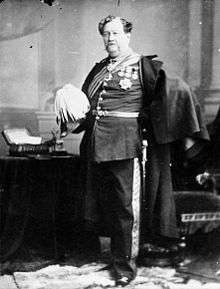William O'Grady Haly
General Sir William O'Grady Haly KCB (2 January 1811 – 19 March 1878) was a British Army officer who was the Commander of the British Troops in Canada.
Sir William O’Grady Haly | |
|---|---|
 Sir William O'Grady Haly | |
| Born | 2 January 1811[1] Middlesex |
| Died | 19 March 1878 (aged 67) Halifax, Nova Scotia |
| Allegiance | |
| Service/ | |
| Years of service | 1823-1878 |
| Rank | General |
| Battles/wars | Crimean War |
| Awards | Knight Commander of the Order of the Bath |
Early life and family
Haly was one of five surviving children born to Richard Aylmer Haly of Wadhurst Castle, Sussex and his wife, Amelia Banister. The family lived largely on his mother's annual stipend from her father, Richard Banister.[2]
Military career
.png)

Haly was commissioned as an ensign in the 4th Regiment of Foot on 17 June 1828.[3]
In 1831, Haly became a Lieut. in the 47th Regiment and made Captain by 1834.[4][5]
In the Crimean War, Haly was wounded in the Battle of Inkerman (1854) and was rescued by Brevet Major Hugh Rowlands and John McDermond, both of whom received the Victoria Cross for their actions. Haly received the Order of the Medjidie.[6]
After fighting in the Crimean War, he became Commander of the British Troops in Canada in 1873.[3] He was given the colonelcy of the 47th (Lancashire) Regiment of Foot from 1875 to his death.[7] and promoted General on 1 October 1877. [8]
He died in office from gout on 19 March 1878.[3] He is buried in the Fort Massey Cemetery.[9]
Family
In November 1839 Haly married Harriett Hebden:[10] their eldest son was Major General Richard Hebden O'Grady Haly.[3]
References
- London, England, Church of England Baptisms, Marriages and Burials, 1538–1812
- Pollock, Frederick; Campbell, Robert; Saunders, Oliver Augustus; Cane, Arthur Beresford; Potton, Edward; Pease, Joseph Gerald; Bowstead, William (1895). The Revised Reports: Being a Republication of Such Cases in the English Courts of Common Law and Equity, from the Year 1785, as are Still of Practical Utility. 1785-1866. Sweet & Maxwell, limited. Retrieved 16 May 2019.
- "Sir William O'Grady Haly". Dictionary of Canadian Biography. Retrieved 30 August 2015.
- p. 421
- p. 217
- p. 409
- "47th (the Lancashire) Regiment of Foot". regiments.org. Archived from the original on 11 October 2007. Retrieved 14 July 2016.
- "No. 24508". The London Gazette. 2 October 1877. p. 5457.
- p.37
- Burke, Edmund (1840). "Annual Register". Retrieved 30 August 2015.
| Military offices | ||
|---|---|---|
| Preceded by Sir Charles Doyle |
Commander of the British Troops in Canada 1873–1878 |
Succeeded by Sir Patrick MacDougall |
| Preceded by John Patton |
Colonel of the 47th (Lancashire) Regiment of Foot 1875–1878 |
Succeeded by Sir William Sherbrooke Ramsay Norcott |